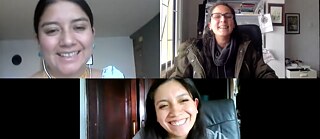Interview with Citlalli Andrango Cadena and Cecilia Larrea
If this history is erased, part of our identity is taken away

How did you find out about your story’s protagonist?
Citlalli: The first time I heard about Dolores Cacuango was in Imbabura during an assembly held by the rural women’s organization (FENOCIN). They mentioned Dolores in reference to her strong will and struggle. But it was due to our work with the comic that I was able to dig into the context and the importance of her life’s fight.
Why does the world need to learn more about your protagonist?
It’s very important to remember the struggle our Indigenous people have had to endure in order to gain rights. It’s part of our identity. If this history is erased, part of our identity is taken away. . . . We must never forget this part of our history because it’s a way to understand our present. If we forget it, if this history is erased, we will minimize all the pain and suffering the people who preceded us had to endure for us to be here right now.
What was the most surprising discovery you made during your research?
That even though we come from different generations, places, and backgrounds, women’s struggles are sewn together in one sisterhood.
What gives you most pleasure while working on the project?
Ce: Drawing!
Citalli: That I keep on learning.
What did you learn from the mentorship?
We loved Nacha’s mentorship. She gave us great advice on our storyboard and how to solve certain problems with illustration and storytelling. We could also see how powerful a tool illustration is. lt has no limits. By being able to share spaces with people working on this project, we could see all the important resistances, struggles and achievements that are currently happening around the world, and we recognized the work people are doing regarding nature and human rights. Each and every story is so inspiring and has to be visualized. The stories and struggles have to circulate.
What aspect have you found most challenging during the process so far?
It has been very challenging to talk about her life in only 30 pages. We think we would need a whole book to talk about all her life goals and struggles! Also, we have struggled working with different languages and working during lockdown with COVID restrictions.
How are you trying to give back to the community?
We are trying to make this publication in Kichwa, Dolores’ mother language and one that is widely spoken in Ecuadorian communities. The Kichwa publication is destined to be included in community libraries and schools to reinforce the language and keep her story circulating.
What should ideally happen after the project’s publication?
First, we think it’s very important to make Dolores’ story known, not only to locals but to the international community. She was an essential part of both Latin American and Ecuadorian history. Second, we wish to continue visualizing other women’s and LGTBIQ+ stories.
What are your plans for the future?
Because we want to keep on working to tell other stories, we have applied for local funding for an animation project. With the help of funding we hope to make it happen by next year and be able to give voice to other stories.